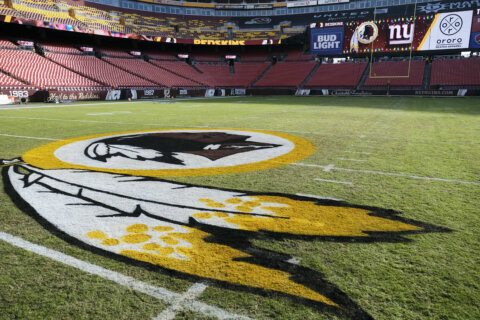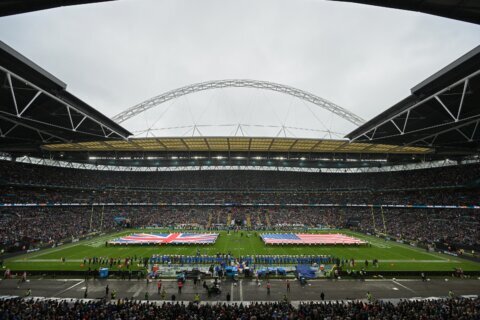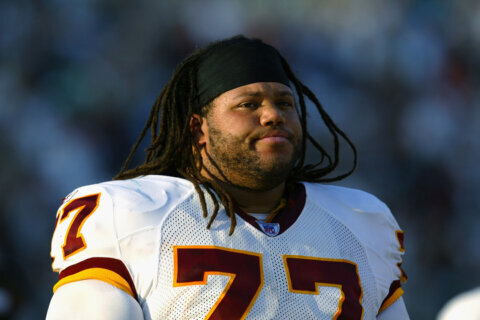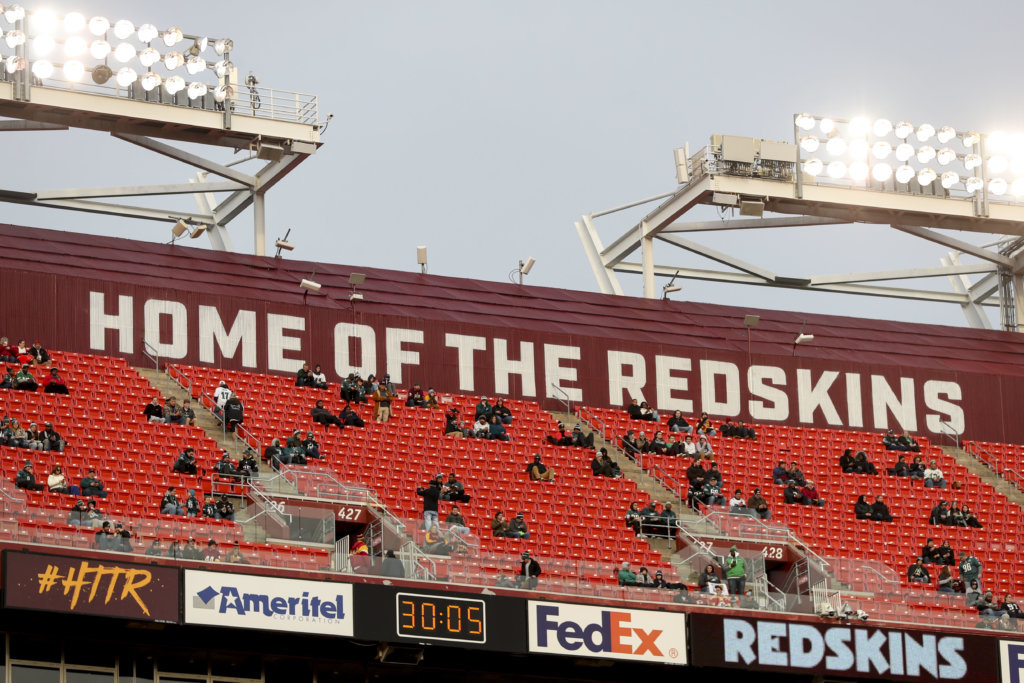
The Washington Redskins said Friday that the team will “undergo a thorough review” of its name, which is considered a derogatory term by Native Americans.
This comes a day after FedEx, the sponsor of the team’s stadium in Prince George’s County, Maryland, since the late 1990s, asked the team to consider changing the name.
Washington’s NFL team has found itself under renewed scrutiny in recent weeks in the wake of the protests prompted by the killing of George Floyd in Minneapolis police custody and the outcry over systemic racism in the U.S.
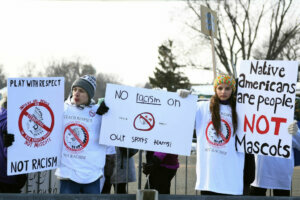
Team owner Dan Snyder has refused, for years, to change the team’s name. But, on Friday, he said the review “allows the team to take into account not only the proud tradition and history of the franchise but also input from our alumni, the organization, sponsors, the National Football League and the local community it is proud to represent on and off the field.”
New head coach Ron Rivera said the franchise name “is of personal importance to me” in Friday’s statement. Just days ago, in an interview with a Chicago radio station, Rivera, a former Bears player, had said “it is a discussion for another time.”
It appears that time has arrived amid mounting pressure from organizations that have financial ties to the team.
Moments after the team’s statement, a PepsiCo Inc. spokesperson released a comment to news outlets, saying the company has “been in conversations with the NFL and Washington management for a few weeks about this issue. We believe it is time for a change. We are pleased to see the steps the team announced today, and we look forward to continued partnership.”
Bank of America and Inova, two more sponsors with the Redskins, have also expressed support for the team’s review of the name.
On Thursday, FedEx, which owns the naming rights to the stadium in Landover for another five seasons, said it “communicated to the team in Washington our request that they change the team name.” FedEx’s sponsorship is worth over $200 million.
Also Thursday, reports arose that Nike had removed all Redskins merchandise from its online store.
The image below shows the team chooser of Nike’s online store. The Washington team’s name is missing below the Tennessee Titans.
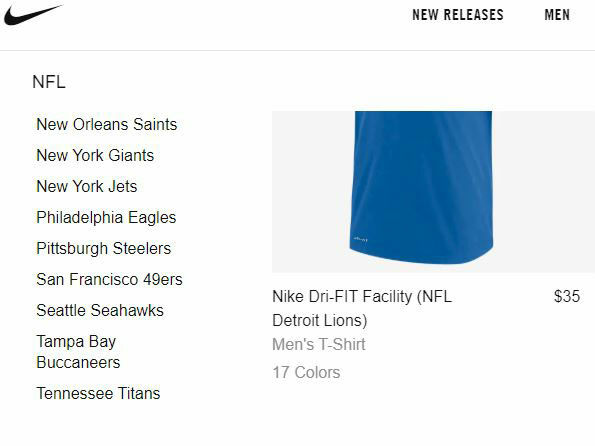
The NFL team’s Friday statement concluded: “We believe this review can and will be conducted with the best interest of all in mind.”
Advocates, leaders react to the move
“Snyder can stand on the right side of history and create a new, positive legacy for his team and change the name,” Joel Barkin, spokesman for the Oneida Indian Nation and the “Change the Mascot” campaign, told WTOP.
“Or, he can instead continue to embrace a bigoted slur that denigrates Native Americans and people of color. I hope he takes the first option,” Barkin said.
More and more Americans have spoken out against the NFL’s use of a “dictionary-defined racial slur” over the course of decades, he added. Beyond major Native American organizations, Barkin said, social scientists, religious leaders and elected officials have all spoken out about the name.
“There are no other groups that have this level of iconography used against them,” Barkin said. “People are coming to realize now that it’s 2020, there is no place to dehumanize … real people”
Amanda Blackhorse, a Dine’ who is part of the Navajo, said she won’t celebrate until the day the team name changes and all references to and images of Native people are removed from the franchise and its brand.
“There is an overwhelming majority of Native people who are offended by the name,” said Blackhorse, who is also a social worker and an indigenous identity advocate. “They’ve been victims of racism, stereotypes, violence even.”
Supporters of the current team name have pointed to disputed polls that seemingly back their claims.
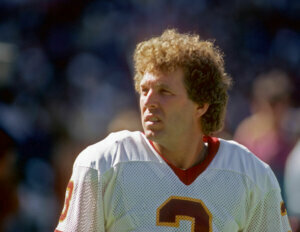
A 2016 Washington Post poll found that 9 out of 10 Native Americans weren’t offended by the name. A 2019 poll from marketing research firm Wolvereye asked respondents to describe what emotions the team’s name made them feel, and the most common response was “proud.” Three of the top five responses had a positive emotion toward the name.
“[The Post] spent a lot of money and time to make sure that was a legitimate survey that they did,” Mark Moseley, a former placekicker for the Redskins from 1974-85 and the president of the team’s alumni association, told WTOP.
“Anybody questioning that would have to ask them [for] a lot of proof in order to prove differently.”
Moseley said that he and other former players, such as wide receiver Gary Clark and running back Ricky Ervins, never had anything negative directed toward them when they went around to Native American reservations holding football camps a few years ago.
“From what I personally have seen and experienced by going and meeting and talking with hundreds of Native Americans, I have not had a negative word said at all — period,” Moseley said.
Blackhorse, however, said The Washington Post poll was a red herring.
She said its findings had been debunked by numerous Native organizations that criticized its methodology. To counter that, Blackhorse mentioned a scholarly study that had been done that said a lot of Native people who strongly identify with their heritage are offended by it.
Advocates for the name change said those most affected by this imagery are younger Native Americans.
“These names actually overwhelmingly harm our youth,” Leah Salgado, the deputy director for nonprofit IllumiNative, told WTOP. “They lower self-esteem and keep Native people from seeing more for themselves.”
Both Blackhorse and Salgado credited the Black Lives Matter movement for bringing attention to the Washington team’s name by highlighting issues of racism in the U.S.
“People are starting to understand the way that systemic racism plays out,” Salgado said. “These mascots, and the words that are associated with them and the behaviors, are part of the problem.”
Prince George’s County Executive Angela Alsobrooks said she was “pleased” with the direction the NFL team was taking in reviewing its name, adding that it was “a positive step.”
“This is a transformational time in our nation that requires deep reflection and decisive action that demonstrates respect for lives and communities that have been historically marginalized,” Alsobrooks said in a statement Friday. “The team’s name is viewed by many as offensive, and we therefore welcome these actions that reflect their willingness to be a part of this historic moment.”
D.C. Councilman Kenyan McDuffie called for the area’s football team to change their name in a news release. In 2014, he introduced legislation, called the Human Rights Educational Institutions Fairness Amendment Act, to prohibit the use of race-based mascots and team names by D.C.-area educational institutions.
“It shouldn’t have taken for this national conversation on race relations to begin before the team decided to take steps to review their name,” McDuffie said. “There is absolutely no room for nicknames, logos, statues, symbols or mascots that do not represent the racially equitable DC that we are fighting for.”
Longtime controversy
What is honored and memorialized in the U.S. has come under intense scrutiny in recent weeks, from the removal of Confederate memorials to re-examining the legacies of U.S. presidents and renaming institutions.
This renewed push to change the name of the three-time Super Bowl team follows a decadeslong fight. Advocates for eliminating “Indian” team names began organizing themselves in the late 1960s, The New York Times reported. Over the years, a number of U.S. schools have done away with such team names; Dartmouth stopped using an unofficial “Indian” mascot in the ’70s.
The Washington football team has used the name since 1933, when it was based in Boston. The franchise initially was called the Braves when it began play in 1932. Founding owner George Preston Marshall moved the team to Washington, along with the name, for the 1937 season.
Marshall, a staunch segregationist, was resolute against integrating the NFL. The team itself was the last in the league to integrate, when eventual Hall-of-Famer Bobby Mitchell joined in 1962.
Snyder, the current owner, took over the team from the family of Jack Kent Cooke, who purchased a stake in the team in the 1960s and eventually became the owner a decade later.
The team name has been the subject of two decisions from the U.S. Patent and Trademark Office, which revoked the trademark in 1999, noting the derogatory name. However, an appeal a few years later returned the rights to Snyder and the organization. This back-and-forth regarding the commercial use of the name “Redskins” continued for nearly 20 years.

In 2013, then-President Barack Obama even weighed in, nudging the team toward a name change.
NFL Commissioner Roger Goodell has supported the Washington franchise’s use of the name more than once. But, on Friday, Goodell seemingly reversed his stance, applauding the team’s decision to review the name in a statement on NFL.com.
“In the last few weeks we have had ongoing discussions with Dan and we are supportive of this important step,” Goodell said.
The National Congress of American Indians lauded the pressure from FedEx in a statement posted to its website Thursday, calling it a “wake-up call” for those who do business with the NFL.
“In this historic moment and global movement for racial justice, they can no longer sit idly by as the league’s Washington franchise clings to a dictionary-defined racial slur as its mascot. The R-word is destined for the dustbin of history — it’s not a question of if, but when, and that time is now,” NCAI President Fawn Sharp said.
She added that the removal of “racist and harmful words, symbols and imagery like the Washington team’s R-word mascot is a necessary and nonnegotiable first step in taking that path.”
As fans of the team have become less-than-thrilled with the trek to Landover to attend home games, the conversation has continued about allowing the team back into the District.
D.C. Mayor Muriel Bowser, however, said in a June radio interview that the team’s name was an “obstacle” for the city working with the franchise to bring home games back to Washington.
In recent weeks, the team removed Marshall’s name from the stadium’s Ring of Fame, and its lower bowl. A statue of Marshall also was removed at RFK Stadium.
WTOP’s Mike Murillo and Jason Fraley contributed to this report



